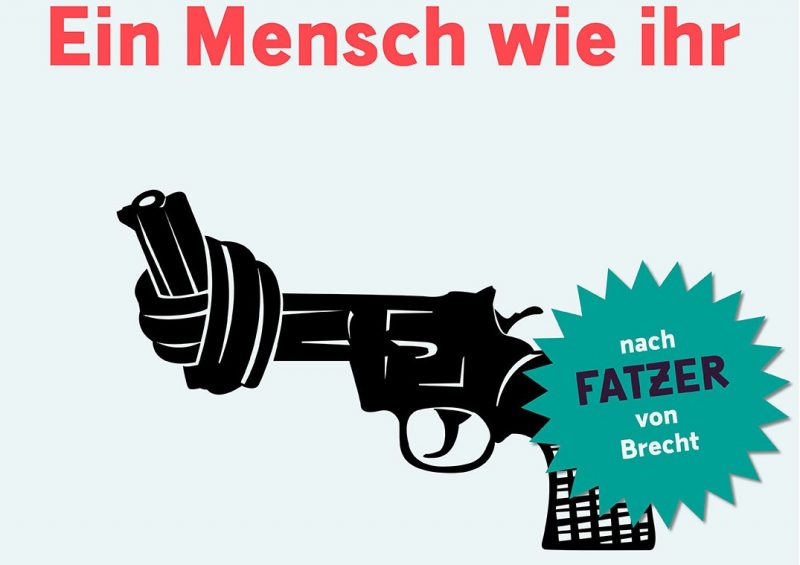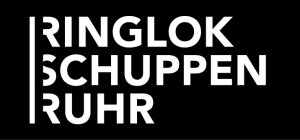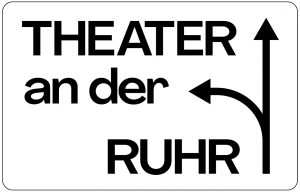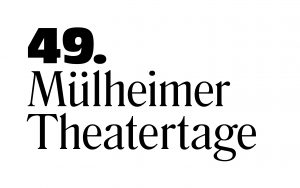FATZER
Ein vielstimmiger Parcours: Theater, Tanz, Geschichten, Fest
The history of mankind is dominated by wars and conquests, by the rise and collapse of countries and empires, by domination and oppression. That this history might have come to its end, as the political scientist Francis Fukuyama claimed in 1989 after the collapse of the USSR, has long been disproved. And yet the war in Ukraine has abruptly torn us from a beautiful dream: War in Europe! As if we had convinced ourselves for decades that the eternal dispute about the right conception of man - whether he is "good by nature", as Rousseau was convinced, or "man's wolf", as Hobbes emphasised - had been decided.
Even if heated debates continue to rage among historians, anthropologists and sociologists, the findings clearly point in one direction: we have always tended to attack each other in an organised way - in other words, to wage war. The Theater an der Ruhr, the Mülheim Theatertage and the Ringlokschuppen Ruhr invite you to a joint theatre tour through the Stadthalle to "think for three minutes" - as Bertolt Brecht's "Fatzer" says - about the human species as a communal being, as an asocial being, as a war-monger and as a creature that can constructively shape the future.
In Mülheim an der Ruhr, during the time of the First World War, when all morality was stripped away, a story took place between four men that ended with the complete downfall of all four, but amid murder, perjury and depravity showed the bloody traces of a kind of new morality. Bertolt Brecht
What Brecht negotiates in the Fatzer fragment is the difference between radical self-centredness and collectivity, between spontaneity and discipline, egoism and a sense of social responsibility. This material forms the foil for very different explorations of the eternal return of war and the eternal longing to live in another world, in a pacified society. Playing, dancing, giving a thoughtful voice to people from the past and present, travelling through dark times into the unconscious, using sound installations, research, video and film, three artistic teams around the choreographer Rafaële Giovanola, the author and director Christine Umpfenbach and the director and visual artist Philipp Preuss as well as a large, diverse choir of citizens with a total of more than 60 participants together with the audience "conquer" the heart of the city and open up a new view of its spaces.
The audience wanders through a theatre parcours made up of very different parts: Fatzer/Body, Fatzer/Voices, Fatzer/Times, Fatzer/Choir...
And what the four war resisters around the egoist Fatzer fail, may we finally succeed together: Forming choirs. Weave bonds! By and with the choir of the Petrikirche, the ensemble of the Theater an der Ruhr, Wisam Atfah, Abdulrazak Balksh, Adel Kalkili, Inge Ketzer, Alaa Nema, Maryam Nema, , Leonce Noah, Amal Omran, Olena Polianska, Jonathan Sanchez and many more.
Texts: Bertolt Brecht (Fatzer), Christine Umpfenbach a.o.
Further performances: 03, 04 November 7 pm In the Stadthalle Mülheim.
A project by vier.ruhr, Theatre Alliance: Mülheimer Theatertage, Ringlokschuppen, Theater an der Ruhr. Supported within the framework of NEUE WEGE by the Ministry of Culture and Science of the State of North Rhine-Westphalia in cooperation with the NRW KULTURsekretariat and und der Stiftung Mülheimer Wohnungsbau.
Mehr Informationen:
Christine Umpfenbach schließt daran an. Zu ihrem Projekt mit fünf Frauen, die selbst oder deren Eltern vor Kriegen geflohen sind, sagt sie: „Mich interessiert an dem ‚Fatzer‘-Material vor allem die Frage von Individuum und Kollektiv. Was ist das für ein Moment, in dem sich ein Mensch entscheidet, sich aus einer Gruppe zu lösen, ‚Nein‘ zu sagen, ‚Nein‘ zu einem System‘ oder ‚Nein‘ zum Kämpfen? Das ist erstmal eine sehr einsame Entscheidung, die einen isoliert und die deswegen nie leicht ist. Man befindet sich im Dazwischen, in einem Niemandsland. Dieser Moment erscheint mir sehr wichtig und mutig.“
Die Choreografin Rafaële Giovanola macht klar: „Es geht um Bewegungen des Einzelnen und der Gruppe, Bewegungen, die den Raum definieren und strukturieren.“ Sie möchte an diesem Abend „einen Zwischenraum, eine Schwelle, einen Raum, in dem Verschiebungen des Hörens, Sehens und Fühlens spürbar werden“ schaffen. Hier sollen sich Betrachter*innen und Akteur*innen vermischen.
Rafaële Giovanola, geboren 1960 in Baltimore/USA und aufgewachsen in der Schweiz, arbeitet als Choreografin und Regisseurin. Sie studierte Tanz bei Marika Besobrasova in Monte Carlo, ihr erstes Engagement führte sie als Solistin nach Turin. 1995 wurde sie in der Kritikerumfrage von „ballett international/tanz aktuell“ in der Kategorie „außergewöhnliche Tänzerpersönlichkeiten“ genannt. 2000 gründete sie zusammen mit Rainald Endraß die freie Gruppe CocoonDance. Rafaële Giovanola arbeitet international und unterrichtet(e) zudem verschiedene Tanzkompagnien, etwa die des Theater Freiburg, des tanzhaus NRW in Düsseldorf und der Ewgenij Panfilow Company in Perm, Russland.
Philipp Preuss, geboren 1974 in Bregenz und aufgewachsen in Wien, ist Regisseur und Mitglied der kollektiven künstlerischen Leitung des Theater an der Ruhr. Er studierte Regie und Schauspiel am Mozarteum Salzburg sowie Theaterwissenschaften und Philosophie in Wien und ist seit 2001 freier Regisseur. Von ihm stammen Arbeiten u. a. am Schauspielhaus Bochum, Theater Dortmund, Schauspiel Frankfurt, Deutsches Theater Berlin, Schaubühne Berlin, Schauspiel Leipzig, Bayreuther Festspiele, Residenztheater München. Preuss inszeniert seit 2001 Ausstellungen mit fiktiv-virtuellen Künstlerfiguren, die von Schauspieler*innen dargestellt werden; er erweitert den Theaterbegriff in den Bereich der bildenden Kunst.
Christine Umpfenbach, geboren 1971 in München, studierte Bühnenbild an der Kunsthochschule Berlin Weißensee und Regie am Goldsmiths College London. Von 2000 bis 2002 leitete sie zusammen mit Antje Wenningmann das Obdachlosentheater Ratten 07 an der Volksbühne Berlin. Seit 2003 entwickelt und inszeniert sie Theaterprojekte im Stadtraum, an Stadt- und Staatstheatern sowie für Festivals unter anderem in München, Freiburg, Riga, Tel Aviv oder Taipei. Ihren dokumentarischen Projekten geht immer eine intensive Recherche voraus. Dabei stellt sie individuelle Biografien von Zeitzeugen in den Vordergrund. Mit ihrer Inszenierung „9/26 – Das Oktoberfestattentat“, erarbeitet an den Münchner Kammerspielen, war sie 2021 für den Mülheimer Dramatikpreis nominiert.





